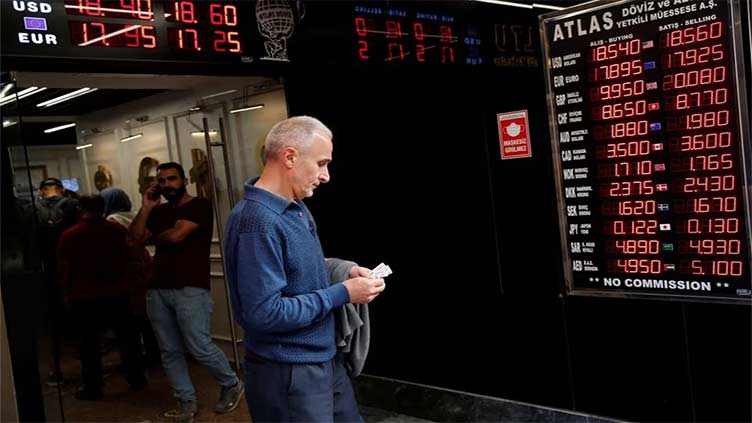Dollar hits 5-week high on inflation worries; lira drops, baht soars

Business
The Turkish lira sank to a two-month low after weekend elections
SINGAPORE, (Reuters) - The U.S. dollar rose to a five-week high against major peers on Monday as the safe-haven currency benefited from inflation worries at home and growth concerns globally, extending gains after its biggest weekly increase since September.
The Turkish lira sank to a two-month low after weekend elections looked headed for a runoff, while the Thai baht rallied almost 1% after Thailand's opposition routed military-allied parties also in weekend polls.
The greenback was buoyed by a rise in Treasury yields after a survey of U.S. consumers' long-term inflation expectations jumped to the highest since 2011, putting a possible Federal Reserve rate hike next month back in play.
Traders currently put those odds at 13%, from close to zero prior to the University of Michigan's poll. However, there are still as many as three quarter-point cuts priced into the market by year-end.
"Too many FOMC (Fed) rate cuts are priced for the near term in our view," Joseph Capurso, head of international economics at Commonwealth Bank of Australia (CBA), wrote in an client note.
"We acknowledge there are tentative signs the U.S. labour market is cooling and underlying inflation is easing, (which) imply a high bar to rate hikes," he added. "But the still-high inflation and tight labour market also imply a high bar to rate cuts in the near term too."
China, meanwhile, is at the centre of renewed worries about a global recession after a spate of disappointing economic data including imports and inflation pointed to tepid domestic demand. More evidence could come from Tuesday's retail sales report.
The Chinese yuan dipped to a fresh two-month low of 6.9740 per dollar in offshore trading on Monday before coming back slightly to 6.9694.
The People's Bank of China kept its seven-day reverse repo rate unchanged at 2%.
The dollar index , which measures the currency against six major peers, reached 102.75 for the first time since April 10 in early Asian trading before then easing slightly to 102.63. It rallied 1.4% last week.
The U.S. dollar is oversold and the dollar index should move toward CBA's end-June target of 104 this week, Capurso said.
The 10-year Treasury yield was little changed in Tokyo, hovering around 3.47%.
That kept pressure on the yen, which tends to move inversely to U.S. long-term yields. The Japanese currency dipped at low as 136.03 per dollar before last trading flat at 135.80.
The euro ticked up 0.11% to $1.08605 after dipping to a fresh five-week low of $1.08445 earlier in the session.
The dollar was last up 0.31% at 19.64 Turkish lira after earlier jumping to 19.70 for the first time since March 10.
Turkey headed for a runoff vote after President Tayyip Erdogan outperformed projections, holding a sizable lead over his rival but falling short of an outright majority.
The U.S. currency sank 0.65% to 33.76 baht in onshore Thai trading, and earlier dipped as much as 0.92%.
Thailand's opposition parties secured a stunning election win on Sunday, but it was far from certain whether they will form the next government, with parliamentary rules written by the military junta.

